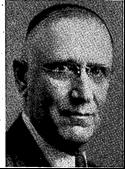Umberger Ruby Winner
Dr. Harry Umberger, 1942

Distinguished Service Ruby Awarded to
Harry John Charles Umberger
Dean, Division of Extension, and Director, Extension Service
1942
HARRY JOHN CHARLES UMBERGER was born on a Kansas cattle ranch of pioneer parents of sturdy Dutch descent. His has been a courageous career of public service to the Nation and to Agriculture. He was put in charge of crews of farmhands more than twice his age while he was yet in his teens. The fundamental training for what he is today was gained in those early years through assuming rather heavy responsibilities. He learned to see difficult jobs through to the end; he learned he could work men and work them hard if he was always fair and unswerving in his decisions. Dean Umberger is a graduate of Kansas State College of Agriculture with Bachelor of Science Degree, 1905, a member of Phi Kappa Phi, Alpha Zeta, Gamma Sigma Delta, and a charter member of Alpha Rho Chapter of Epsilon Sigma Phi. He is an avid reader of scientific literature, and has an extensive library of Natural History.
As a practical farmer, he is convinced from his own experience that farm management plans based on account keeping is a fundamental and sound practice for, any farmer. He is firmly convinced that while farming is a manner of living, it can be profitable if it is done scientifically. Because he knows both the scientific and practical sides of farming, he can see through situations and catch the significance of movements as they affect all agricultural interests and sections of the country. He is often called into consultation as an adviser on national agricultural problems. He thinks his own thoughts and acquiesces or objects to other's decisions according to impersonal and unbiased principles. His integrity and motives are never questioned—calm and fearless under criticism—he "chooses the right with invincible resolution." After performing what most could not accomplish, he passes on to other tasks, and says nothing about the accomplishments.
After graduation Dean Umberger was appointed Scientific Assistant, Bureau of Soils, U. S. Department of Agriculture, in 1906. He held the position as Scientific Assistant, Bureau of Plant Industry, U. S. Department of Agriculture from 1907 to 1911. During that time he established and superintended the Experiment Station at Moro, Oregon, in cooperation with the Oregon Agricultural College. In 1911 Dean Umberger returned to Kansas to become the Assistant in Charge of Cooperative Experiments, Kansas State Agricultural College; in 1915 Demonstration Supervisor and Assistant County Agent Leader; in 1917 County Agent Leader and in 1919 was promoted to Acting Dean and later in 1919 to Dean, Division of Extension.
Dean Umberger has been active in connection with a large number of professional interests. A few assignments over a period of years are listed as follows: Chairman, Radio Committee of Association of Land-Grant Colleges and Universities; Vice President, National Committee on Education by Radio; Chairman, Regional Advisory Committee on Land Use Practices, Southern Great Plains Area; Vice President, American County Life Association; Member of Board of Directors, Southwest Wheat Improvement Association; Upper Arkansas River Drainage Basin Committee of the National Resources Planning Board; and Member, Committee to Consider Desirable Procedure for Including Home Living in Cooperative Plan with the Federal Land Bank.
Dean Umberger's confidence in his employees is shown by the way he delegates responsibilities including the necessary authority to complete the job without interference on his part, and he expects that work to be done well. He also has a genuine confidence in the leadership of rural people. His sincere regard for the respect of intelligent, progressive farmers who are interested in national problems is probably based on his deep-rooted conviction that the farm families who own, manage, and live on their own farms and pass on to succeeding generations their own ability to work and their love of the land are the most stabilizing influence in shaping national affairs and in building a Nation, that we have in this country.
